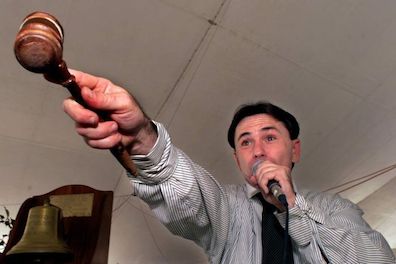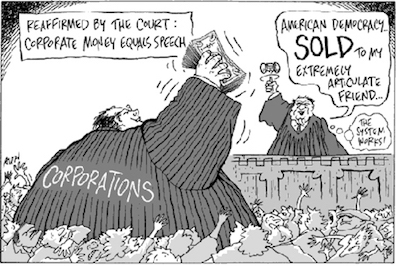“Short knock”
Early on in Calypso Joyce repeatedly introduces his readers to a feature of Bloom’s mind that will reappear throughout the day: his preoccupation with schemes for making and saving money. In several passages from this part of the book, he thinks of ways that sharp people make a quick profit, often by transgressing moral and legal boundaries. Bloom himself appears concerned to stay on the right side of these lines, but he is keenly interested in other people’s dodgier schemes, and his thoughts are full of contemporary Irish and British idioms for such actions.
His father-in-law Brian Tweedy, Bloom thinks, “had brains enough to make that corner in stamps. Now that was farseeing.” To corner a market means buying up a controlling share of the limited supply, so Tweedy, Gifford infers, “had apparently bought up all available copies of an unusual stamp before the stamp was recognized as valuable.” Such an action would indeed be farseeing. Bloom’s own purchase of a used raincoat from the “lost property office” was a less spectacular coup: “Railroad stations,” Gifford notes, “had periodic sales to dispose of unclaimed lost articles.”
Other details suggest unethical and possibly criminal conspiracies. Of the bed that he and Molly sleep on, Bloom recalls that Tweedy “Bought it at the governor’s auction” in Gibraltar. “Got a short knock.” The bidding at an auction ends with the rapping of a gavel, so a short knock would mean a hastily concluded bidding process—perhaps because the auctioneer corruptly intended to guarantee the success of a particular bidder and minimize his cost. This supposition coheres with Bloom’s suspicion that many British officers are “in the swim”: “In league with each other in schemes to make money,” in Gifford’s gloss. Historical records are stuffed with such schemes by military officers.
A bit later in Calypso Bloom wonders how pub owners become so rich. There is a “General thirst” in Dublin, but “Then think of the competition.” “Off the drunks perhaps,” he supposes. He tries to figure in his head what kinds of margins the publicans might make and how much income it would produce, but detours into imagining that conspiracies are involved: “On the wholesale orders perhaps. Doing a double shuffle with the town travellers. Square it with the boss and we’ll split the job, see?” Gifford glosses double shuffle as “A trick, a piece of fakery (after a hornpipe step that involves shuffling both feet twice). ‘Town travelers’ are traveling salesmen. The ‘double shuffle’ would thus amount to some manipulation of wholesale prices by getting the salesman to overcharge and then split the proceeds.”
Bloom himself dreams up countless ways to get rich quick. Ithaca uses the word “scheme” ten times in the space of one page as it catalogues a fantastic array of such plans that he has conceived. But there is nothing criminal about Bloom’s plans: they range from sheer wish-fulfillment (happening upon an undiscovered seam of gold ore, accidentally discovering a rare postage stamp) to ideas for civic improvements that Bloom lacks both the resources and the know-how to see into development. He dreams these big happy dreams of wealth, Ithaca notes, because they help him to get to sleep at night.
It appears that Bloom was once nearly arrested for selling, or attempting to sell, some Hungarian lottery tickets that were not sanctioned by the Irish authorities. But he is no financial shark. He is one of the great mass of human beings who work hard to get by and who wonder why a small number of plutocrats have all the money: “This owner, that. Landlord never dies they say. Other steps into his shoes when he gets his notice to quit. They buy the place up with gold and still they have all the gold. Swindle in it somewhere” (Lestrygonians).
Despite his honesty and his lack of true plutocratic credentials, Ithaca makes clear that Bloom is quite well off by Dublin standards, and many other Dubliners have their own conspiratorial speculations about how the Jew in their midst has managed to amass his wealth. As Hugh Kenner writes in “The Rhetoric of Silence” (JJQ 14.4), “Joyce is careful not to discount too much the stereotype of Semitic fiscal cunning” (389).
John Hunt 2017
Auctioneer with gavel. Source: www.thestaffingstream.com.
Auctioneer with gavel. Source: www.abc.net.au.
Source: img.koreatimes.co.kr.


